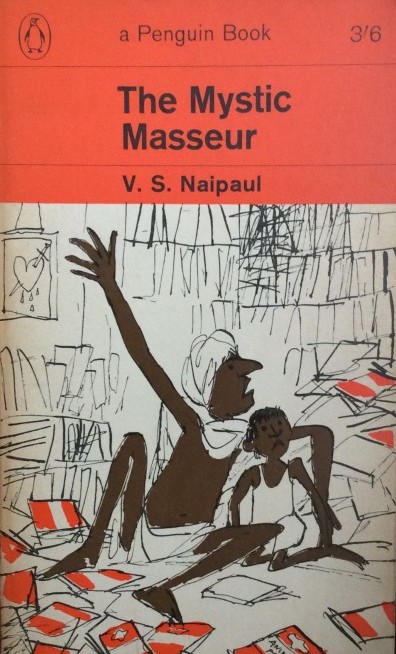Inspiring Older Readers
 posted on 25 Jul 2021
posted on 25 Jul 2021
The Mystic Masseur by V.S. Naipaul
It’s been such a long time since I read one of Naipaul’s earlier novels that I’d forgotten that he can be such an entertainer – his rancorous latter years full of bile and argument rather curdled his reputation for me and this has made me steer clear of his books for so many years. I picked up The Mystic Masseur in its Penguin first edition – the one with the fantastic Quentin Blake cover – and I was so pleased with it that I just had to sit down and read it. I’m really glad I did.
Published in 1957, this is Naipaul’s affectionate and playful satire about life on his home island of Trinidad. Set in the 1940s, it concerns the life story of Ganesh Ramsumair, the masseur of the title, but it is also a portrait of the Indian-heritage community that Naipaul himself came from - and it’s not hard to see just how deeply invested he is in that world. There’s an irresistible mix of affection and an almost frustrated humour that runs through the story like a vein of gold.
Ganesh stumbles his way from failed author to unexpected masseur and eventually on to being a politician and hero of the people about whom songs are written. At every stage of his journey Ganesh succeeds despite being something of a fraud or accidental hero.
Rachel Redford writing in The Guardian (about the audio book) quite rightly observes:
“What makes this, Naipaul's first novel, so delightful is (..) the author's wickedly sardonic humour and his eye and ear for the absurd”
In many ways the plot is the least interesting aspect of the book. Ganesh’s career journey is really just an excuse to give Naipaul the chance to sketch the people who are the heart and soul of the community. As a result of this he’s able to create big characters who fill the pages of the book and threaten to burst out into the real world. Martin Levin’s review of the novel in The New York Times describes this in colourful terms:
“Most of the salty cast of this earthy extravaganza, however, are crazy as foxes: Ramlogan, Ganesh's knavish father-in-law, tries to welsh on the dowry. Narayan is treasurer, and chief benefactor, of the Home For Destitutes Fund. Indars is the founder of Socialinduism ("Came to me in a flash, old boy. Reading Louis Fischer's book about Ghandi."). And of course the trancendental massager himself has an eye for the main chance.”
Then there’s the wonderful character of Ganesh’s aunt, The Great Belcher, who punctuates all of her communications with ripe burps that roll from her incessantly. Or Ganesh’s wife Leela who manages to be both submissive and feisty at one and the same moment. I could go on listing the wonderful parade of characters that keep on coming…
The icing on the cake is Naipaul’s wonderful ear for language. He manages to combine conventional narrative English with the dialect and structure of Trinidadian English as spoken in the rural community he’s created for us. It’s a powerfully creative mix that is pregnant with ambiguities and humour and a perfect tool for sharpening the absurdities he wants us to pick up on.
As I said at the beginning of this review, I had completely forgotten that he could be so playful and I was struck this time around by the fact that this version of Naipaul must have been a huge influence on the early writing of Salman Rushdie because I kept hearing echoes in here of Midnight’s Children – both in tone of voice and in intension of purpose.
The book is, of course, available in various cheapish paperback editions but if you want a hardcover first edition you’ll have to dig deep because prices will surprise you.
Terry Potter
July 2021